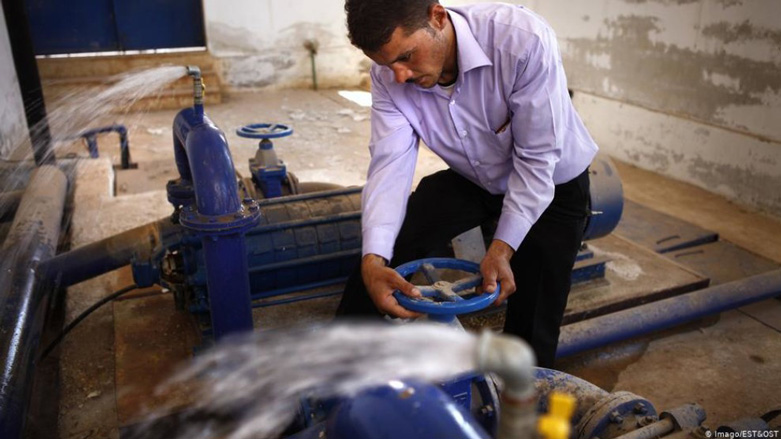Turkey, for sixth time, cuts water supply to 460,000 civilians in north Syria

ERBIL (Kurdistan 24) - For the sixth time since October, Turkish-backed armed groups on Wednesday cut the flow from the Alouk reservoir that supplies water to areas in northeastern Syria’s Hasakah province that are controlled by the Kurdish-led local government, depriving some 460,000 civilians in the region of the essential resource.
The local Hawar News Agency reported that workers had not entered the Alouk water station for ten days and the reason for the action was not immediately clear.
Speaking to the Syria-based Rojava Information Centre (RIC), an official from the local administration’s Directorate of Water, confirmed the news.
“The waterflow from Alouk was cut off for over a month after Turkey bombed the station on the first day of its offensive,” Thomas McClure, a Syria-based researcher at RIC, told Kurdistan 24.
“It was then restored, only to be cut off three times in February and March as a means of applying political pressure on the AANES (Autonomous Administration of North and East of Syria), and cut off again by Turkish shelling of the waterpipe at the end of March.”
“Today’s severance, confirmed by the Hasaka Water Bureau to RIC, therefore marks the sixth time Turkey has cut off water flow from Alouk to Hasaka,” he added.
The Alouk water station is near the border town of Ras al-Ain (Serekaniye), which Turkey and its militant proxies took over in October during Turkey’s so-called Peace Spring Operation.
Under Russian mediation, though, Kurdish-led authorities in northeastern Syria have been providing electricity to the Turkish-occupied areas in exchange for water flow, but Turkish-backed groups have continued to repeatedly cut off water, demanding higher levels of power.
Furthermore, the Energy Directorate of the Autonomous administration in Hasakah on Monday accused Turkey of reducing water flow from Turkish dams, which limited the number of hours of electricity in northeastern Syria coming from dams under administration control.
The Water Directorate announced on March 24, that it was beginning to install a new water pumping station as an alternative to Alouk in al-Himme area, located to the west of Hasakah. It warned, however, that such a project would not be capable of providing anywhere near to replace Alouk and was being forced to look for additional water sources.
On March 23, UNICEF Representative in Syria Fran Equiza said the interruption “during the current efforts to curb the spread of the coronavirus disease puts children and families at unacceptable risk.”
Read More: Turkish-backed group’s disruption of water puts 460,000 people at risk, UNICEF warns
Her sentiment echoed those of some vocal German officials and groups like Human Rights Watch (HRW), which warned in late March that “Turkish authorities’ failure to ensure adequate water supplies to Kurdish-held areas in Northeast Syria is compromising humanitarian agencies’ ability to prepare and protect vulnerable communities in the COVID-19 pandemic.”
Read More: Turkish-backed groups in Syria ‘weaponizing water in global pandemic’: HRW
On March 27, 49 Syrian civil society and human rights organizations also condemned the water interruption in a jointly signed statement.
“This intentional denial of water that the residents of these areas are suffering is a blatant violation of international humanitarian law and is a war crime,” the statement read.
The organizations called on UN agencies, as well as the United States and the European Union, to “pressure the Turkish Government to allow the provision of water to deprived areas.”
Editing by John J. Catherine
